



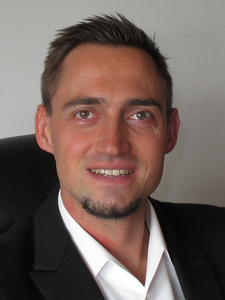
Michael Dumbser received his PhD degree from the University of Stuttgart (Germany) in 2005. His doctoral dissertation under the supervision of Prof. Munz was about the construction of arbitrary high order accurate numerical schemes for the solution of hyperbolic conservation laws on unstructured meshes with applications to computational fluid dynamics and computational aeroacoustics. For his contributions in the fields of applied mathematics and computational fluid mechanics MD was awarded with the Heinz Maier-Leibnitz award 2007 of the German Science Foundation (DFG) and with the Richard-von-Mises award 2007 of the International Association of Applied Mathematics and Mechanics (GAMM).
Subsequently he became a research fellow at the University of Trento (Italy) in the group of Prof. E.F. Toro, where he was working on new approximate Riemann solvers and on arbitrary high order (ADER) finite volume schemes for hyperbolic conservation laws, on new algorithms for the simulation of geophysical fluid flows and compressible multi-phase flows and also on new schemes for computational seismology. Two major contributions there were the development of the first parallel arbitrary high order accurate discontinuous Galerkin finite element scheme with time-accurate local time stepping (LTS) for seismic wave propagation on unstructured tetrahedral meshes and of the first arbitrary high order accurate WENO finite volume scheme on unstructured simplex meshes in three space dimensions.
In 2011 MD was awarded with an ERC Starting Grant for his research project STiMulUs and since 2015 he is Co-PI of the EU H2020 FET-HPC project ExaHyPE.
MD was associate professor for numerical analysis at the University of Trento from 2011 to 2018 and since November 2018 he is full professor and chair of numerical analysis at the University of Trento. His current research interests are high order schemes for nonlinear hyperbolic systems of PDE with non-conservative products, stiff relaxation source terms and involutions, high order ADER-WENO finite volume schemes on unstructured meshes, high order discontinuous Galerkin (DG) finite element schemes with novel a posteriori subcell limiters, adaptive mesh refinement (AMR) with time-accurate local time stepping, high order Lagrangian schemes on moving unstructured meshes with topology change and novel structure-preserving staggered semi-implicit schemes for continuum mechanics.
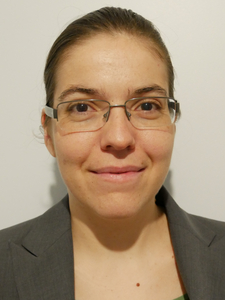
Virginie Ehrlacher is a researcher at Ecole des Ponts ParisTech and is a member of the INRIA project-team MATHERIALS.
She did her undergraduate studies at the Ecole Polytechnique (2004-2008) and received
her master of science degree from the University Paris 6 and Ecole des Ponts ParisTech in 2009.
She obtained her PhD degree in Applied Mathematics from Ecole des Ponts ParisTech in
2012 and was a postdoc at the University of Erlangen-Nürnberg in Germany.
Her research interests and activities lie in the design of numerical methods for high-dimensional problems in materials science applications.
She especially studies model-order reduction and tensor methods, with applications in quantum chemistry, kinetic equations and multi-scale problems.
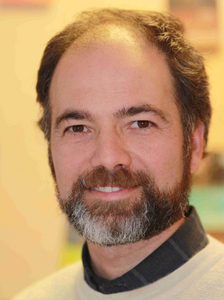
Alexandre Ern defended his PhD in Mechanical Engineering at Yale University in 1994 and his Habilitation in Applied Mathematics at University Pierre et Marie Curie Paris 6 in 1997. Since then, he is Professor of Applied Mathematics at Ecole des Ponts, Paris. He is also Associate Professor of Numerical Analysis at Ecole Polytechnique, Paris, since 2010, and Senior Researcher at INRIA Paris since 2016.
The research of Alexandre Ern deals with the devising and analysis of finite element methods in various flavors, in particular stabilized methods, discontinuous Galerkin and Hybrid high-order methods. His work is also concerned with a posteriori error estimates and adaptivity. The most salient applications are in fluid and solid mechanics and porous media flows. Alexandre Ern has co-authored three books (one on multicomponent transport, one on finite elements and one on discontinuou Galerkin) and he has written over 150 papers in peer-reviewed journals. He is at the time of writing bringing to a close a comprehensive book project on finite elements with Jean-Luc Guermond. He has supervised about 20 PhD students and 10 post-doctoral fellows, and he has ongoing collaborations with several industrial partners.
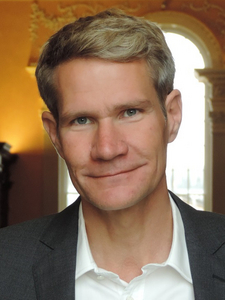
Per-Gunnar Martinsson is a Professor of Mathematics at the University of Texas at Austin. Prior to joining UT Austin, Martinsson served as a Professor of Mathematics at the University of Oxford, and he has previously held faculty positions at the University of Colorado at Boulder and at Yale University. He earned his Ph.D. in computational and applied mathematics in 2002 from UT Austin. He received an M.Sc. degree in Engineering Physics in 1996 and a "Licentiate" degree in Mathematics in 1998, both from the Chalmers University of Technology in Sweden. Martinsson was the recipient of the SIAM 2017 Germund Dahlquist Prize.
Martinsson's research concerns the development of faster algorithms for ubiquitous computational tasks in scientific computing and data sciences. Recent work has focused on randomized methods in linear algebra, fast solvers for elliptic PDEs, O(N) complexity direct solvers, structured matrix computations, and high order accurate methods for scattering and fluid problems.
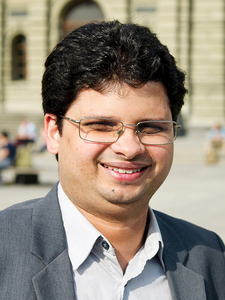
Siddhartha Mishra received his PhD in Applied Mathematics from the Indian Institute of
Science (IISc)- Tata Institute of Fundamental Research (TIFR), Bangalore, India in 2005. After holding a postdoctoral position at the University of Oslo, Norway, Mishra joined ETH Zurich in 2009, where he is currently professor for applied Mathematics.
Mishra's research has focussed on the design of robust and efficient numerical methods for hyperbolic systems of conservation laws in several space dimensions. In this context, he has designed entropy stable arbitrarily high-order finite volume schemes and space-time discontinuous Galerkin finite element methods. He has also designed algorithms, based on sampling methods such as (multi-level) Monte Carlo and Quasi-Monte Carlo, that converge to statistical notions of solutions such as entropy measure-valued and statistical solutions, with applications in uncertainty quantification for nonlinear PDEs. His work has been applied in computational aerodynamics, astrophysics and geophysics. For his contributions, Mishra has been awarded with the Collatz prize of ICIAM (2019), Jacques Lious Lions award of ECCOMAS (2018), Richard von-Mises prize of GAMM (2015), ERC starting grant (2012) and ERC consolidator grant (2017).

Anna-Karin Tornberg is a professor in Numerical Analysis at the Royal Institute of Technology (KTH) in Stockholm, Sweden, since 2012. Her research concerns the development of numerical methods for the solution of PDEs. One recent specific focus has been on boundary integral methods for fluid flows involving particles and drops, and with that development and analysis of important components such as fast methods to accelerate the computations and numerical quadrature techniques for evaluation of singular and nearly singular integrals.
Tornberg is an elected member both of the Swedish Royal Academy of Engineering Sciences (IVA) (since 2015) and of the Swedish Royal Academy of Sciences (KVA) (since 2010). In 2014, she was awarded the Göran Gustafsson prize in Mathematics in Sweden as its first female recipient. Earlier awards include the selection as an Alfred P. Sloan research fellow (2006) while Tornberg was part of the faculty at the Courant Institute of Mathematical Sciences (New York University) as well as the Leslie Fox First Prize in Numerical Analysis (2000). She has served as an associate editor for Journal of Computational Physics for eight years.
Tornberg has recently been an invited speaker at ICM (2018) and a plenary speaker at ICIAM (2019).
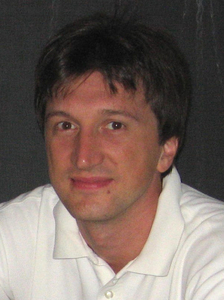
Marco Verani is a professor of Numerical Analysis at the Laboratory MOX-Department of Mathematics of Politecnico di Milano and Research Associate at the IMATI-CNR Istituto di Matematica Applicata e Tecnologie Informatiche "Enrico Magenes" of Pavia. He received his MS degree in Mathematics from the University of Pavia in 1998 and his PhD degree in Computational Mathematics and Operations Research from the University of Milano in 2003. He was appointed assistant professor in 2002 and associate professor in 2015. His main research activity concerns: design, analysis and applications of numerical methods for the approximation of PDEs on polytopal meshes (VEM, MFD, Poly-DG); design of numerical strategies for shape and topology optimization; analysis of convergence and optimality properties of adaptive algorithms, with a focus on hp-adaptive finite element methods. He is also actively involved in promoting and employing mathematics as a tool to foster social inclusion (prevent gambling abuse, empower young unaccompanied migrants)
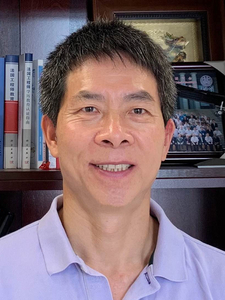
Chuanju Xu is a Professor at Xiamen University. He received his BS (1986) in Pure Mathematics from Xiamen University, MS (1989) degree in numerical analysis from University of Paris-Sud, and PhD degree in numerical analysis from University of Paris-VI in 1993. Then he became associate professor (1995), professor (2000), and chair professor (2004) at Xiamen University.
Meanwhile he has been a visiting professor at a number of institutions around the world, in particular universities in France. His research focuses on the development of high-order numerical methods for incompressible flows, especially the design and analysis of spectral (element) methods for immersed interface in incompressible flows, phase-field models for two phase flows, large-eddy simulations, molecular beam epitaxy, etc.
Most recently, his research interests have been focused on high-order methods for non-local problems, including integral equations, fractional differential equations related to abnormal diffusion and memory effect.